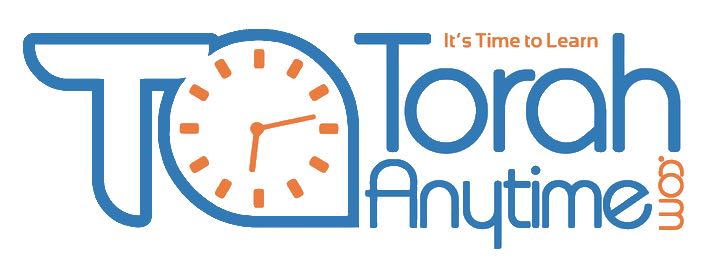Parshas Aikev
/While I was running a shabbaton in Patchogue, Long Island thirteen years ago on Shabbos Nachamu, my wife, oblivious to my responsibilities to the program, decided to go into labor. I tried to explain to her that this was a bad time and could she please wait till tomorrow, but she was insistent – she was going to have the baby now. We finally worked out a compromise and she agreed to wait until after Shabbos. So right after Havdallah I packed up the kids and a babysitter and we went to the hospital. Just to prove her point she gave birth as soon as we got there, a beautiful baby boy.
Now this was quite a surprise in our family. You see, I’m one of six boys and no sisters. Almost all the grandchildren in the family at this point were boys. Suddenly I had two girls. This was a major development, and so the family decided that I would have the girls for the Orlofsky clan. That was fine – I just like to know what’s going on. So when the doctor said that our third child was a boy, we asked for a second opinion.
Now if you have been following this rather maudlin story till this point, you probably have realized that my son is about to have his Bar-Mitzva. Or more appropriately, Bar Mitzvas. We are not going to have one paltry Bar Mitzva, oh no. You see, the trend continued and my son Yaakov is the only boy of our eight children. As such this is the Bar Mitzva, and we have to get it all in. So my son will have one at the Kosel, one in shul on Shabbos, a seudas chaverim for his friends, a kabbalos ponim (which I once heard described as “the borekas/seforim exchange) and then another Shabbos Bar-Mitzva for all the relatives in America who couldn’t make the first one. Two straight weeks of non-stop Bar Mitzvamania.
What I don’t want to get lost in the midst of all the celebrating is the real celebration – the fact that my son becomes entitled to be an adult member of Klal Yisroel. So on this auspicious occasion please allow me to share a thought with my son, my guests and all of my close friends who read the English HaModiah (I consider you a close friend even if you didn’t buy the paper, as long as you read my article).
There are a number of famous possukim in Parshas Aikev. I don’t mean famous in the same sense as people who refer to “a famous Chazal” or “a famous Abarbanel”. There, it refers to anything the speaker happens to know. I am referring to famous from the point of view of the world at large. One of the most famous is in פרק ח' פסוק ג' , כי לא על הלחם לבדו יחיה האדם"” which they translate as “man does not live by bread alone”. They usually quote this verse as an explanation for why they are having dessert after they said they were stuffed. Man does not live by bread alone! Oh no! He also needs fine food and wine. Cake, candy bars, meat and of course breakfast cereals that have more sugar in one box than is produced by Honduras in a year.
The problem is, of course, as is often the case, that they neglected to finish the possuk, "כי על כל מוצא פי ה' יחיה האדם" - ”rather it is what comes out of Hashem’s mouth that gives a person life”. You think you need bread to live? Of course not, the source of everything in this world – what allows you to exist, is the breath that comes from Hashem. There are those who suggest that one approach to understanding the Chazal that says this world was created with the letter ה is because the letter doesn’t really have a sound. It’s a breath - פי ה'.
The Even Ezra gives a much deeper understanding of this posuk. And I mean much deeper. So deep that the peirush on the Even Ezra, the Avi Ezer, stresses that he can’t really explain this if you don’t already understand. We don’t eat like animals in this world. Let me correct that. There are people who eat like animals, but human beings cannot possibly be sustained in this world like animals. You see, we have a neshoma. And a neshoma is not going to be sustained by a piece of bread (or even a delicious steak – see the first perek of Mesillas Yesharim). Yet we know that if you don’t eat, your neshoma isn’t going to be hanging around either. So what sustains your neshoma?
The Even Ezra explains that food is not just food. There are two parts to food, the physical part (usually easily identifiable) and a spiritual part (harder to detect). The physical part sustains our body, not unlike an animal, but there is another part of the food. It’s a spiritual component described as פי ה' , the breath, so to speak of HaKadosh Boruch Hu, that sustains every aspect of the universe.
Let’s develop this a bit. Or rather let’s pretend we understand what the Ramchal is talking about in his “Derech Etz Chaim”, usually printed at the back of Mesillas Yesharim. What is the source of all physical existence? This is an issue that science has been grappling with even before there were Bunsen burners. Science searched out elements, then atoms, followed by subatomic particles and finally quarks. Now they're looking for the shadow of a quark. But after they’ve reached the shadow of a shadow of a shadow, they will, without a shadow of a doubt (or a quark) be no closer to discovering what’s at the root of existence. It’s פי ה', the source of all existence. The breath of the ה, the ten statements which form the basis of creation and continue to be the source of all physicality.
When we eat, we are drawing out the spiritual energy in order to allow our neshoma to remain with us. The physical food is the wrapper. Not by bread alone, although that might work for an animal (and the occasional lower life forms like hockey players), but for true human beings we live by the mouth of Hashem.
That’s the point of the beginning of the posuk – "ויענך וירעבך ויאכלך את המן" . Hashem fed us the mon so we would understand this concept. You see, mon has no physical side to it. It’s all ruchnius. Not by bread alone, but by the power that comes from the ruchnius in the bread.
In the forty and the fifties, people used to call money “dough”. In the sixties and seventies people called it “bread”. And all the time people called it “living”. I want someone who can make a living. What do you do for a living? Can you make a living doing that? They obviously didn’t understand the beginning or the end of the posuk. Hashem gave us the mon to test us, to teach us that man doesn’t live by the bread, or the money, alone. Rather it’s from the ruchnius in the food, or from the ruchnius that the money can generate. Mon fell once a day, enough for one day – no more. This gave you a chance to understand, as the Daas Zekanim explains, that money, support, food, everything comes from פי ה', from the mouth of Hashem.
How different life would be if we all understood this. That the physicality is not enough to sustain us. It is Hashem, His Torah and His Mitzvos. If we understood that, then we wouldn’t cut short our learning to get to work, we’d cut short our work to make sure we got in our learning. We wouldn’t cut corners in our monetary dealings because we understand that it all comes from פי ה'.
When a boy becomes a man, when he assumes his responsibilities among the rest of Klal Yisroel, what does he have to know? He has to understand that now life begins. Until now we were learning, practicing to be an adult. So what if we played kugelach and collected every new set of cards that came out? So what if we took exceptional pride in our apricot pit collection, or our ability to ride our bicycle without hands down a sidewalk crowded with pedestrians as we say “beep, beep”. That’s all behind us now. Now we get our yetzer hatov, the ability to go out into the world and reveal the essence of everything פי ה' . To uncover the ruchnius in even the most mundane things.
As a parent, I feel it my sacred obligation to tell over everything my children have ever said or done, partly to take pride in their accomplishments, but mostly to see the look of mortification on their faces when I speak about them in public. So here goes. When I was walking back from the Kosel with my son Yaakov after he had donned tefillin for the first time, I asked him “how do you feel”? He replied “older”. Being a grown-up, being able to understand why we are in this world and being prepared to do our part in it, this is the key of becoming a Bar- Mitzva. Now you can have some borekas.
Good Shabbos









Sponsored by Anonymous
May you and your family be blessed and may Hashem grant you health, happiness, Nachas and the strength to keep encouraging all of us.